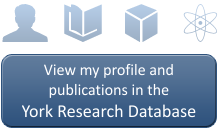Dr Thierry Tonon
CNAP ART Lecturer in Algal Biology
Research
Algae represent a polyphyletic group with differing life styles (aquatic, terrestrial, extremophile, symbiotic), and result from complex evolutionary histories. Their importance to aquatic ecosystems and to biogeochemistry, as well as their potential for biotechnology, make them a very stimulating area of study. In this context, my interests are on algal physiology, enzyme characterization, evolution of metabolic pathways, and on developing biotechnological applications based on algae and/or algal genes.
More information can be found at:
- PublicationsList.org (http://publicationslist.org/Thierry_Tonon),
- RESEARCHERID (http://www.researcherid.com/rid/A-3214-2009),
- ResearchGate (http://www.researchgate.net/profile/Thierry_Tonon),
- Loop (http://loop.frontiersin.org/people/84638/overview),
- Google Scholar (https://scholar.google.com/citations?user=TpybtzEAAAAJ),
- ORCID (http://orcid.org/0000-0002-1454-6018)
Teaching and scholarship
![]()
When teaching, I use my experience and enthusiasm to help students learning more on algal biology and biotechnology. I also encourage them to acquire new information independently, and to develop new skills and critical thinking.
![]()
Algal research covers a broad range of topics, from basic to apply science, and is evolving fast. In my lectures, I combine basic knowledge on algal biology with description of emergent technologies and biotechnology applications relying on micro- and macroalgae (seaweeds).
![]()
My tutorials cover different research areas related to algal biology and biotechnology. I try to link my tutorials to recent research reports and to new opportunities arising from the use of algae. I see tutorial sessions as opportunities for students to practise and develop presentation skills, to learn how to critically assess the published literature, and to give them feedback on their written work.
![]()
Projects offered are aligned with ongoing research in the group, and are primarily lab-based. They are good opportunities for students to develop their technical and organizational skills. Previous projects included the characterization of recombinant algal proteins. Students can discuss their experiments and results formally and informally with their supervisor to ensure good progress.



